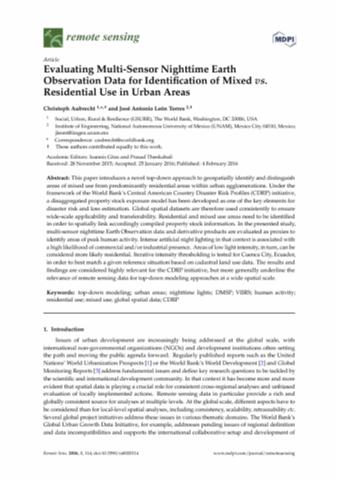Location
Molecular Diversity Preservation International (MDPI), an organization for deposit and exchange of molecular and biomolecular samples, was active in 1996-2010.
Members:
Resources
Displaying 6 - 10 of 21Sustainability of Land Groups in Papua New Guinea
This paper consists of a review of existing literature relating to Incorporated Land Groups in Papua New Guinea (PNG), followed by a case study of two urban incorporated land groups (ILGs) in the city of Lae. The paper is an attempt at assessing the sustainability of ILGs in the country. The challenges facing the ILGs have heightened public fears that the land groups may not be sustainable.
Evaluating Multi-Sensor Nighttime Earth Observation Data for Identification of Mixed vs. Residential Use in Urban Areas
This paper introduces a novel top-down approach to geospatially identify and distinguish areas of mixed use from predominantly residential areas within urban agglomerations. Under the framework of the World Bank’s Central American Country Disaster Risk Profiles (CDRP) initiative, a disaggregated property stock exposure model has been developed as one of the key elements for disaster risk and loss estimation. Global spatial datasets are therefore used consistently to ensure wide-scale applicability and transferability.
The potential role of neglected and underutilised crop species as future crops under water scarce conditions in sub-Saharan Africa.
Modern agricultural systems that promote cultivation of a very limited number of crop species have relegated indigenous crops to the status of neglected and underutilised crop species (NUCS). The complex interactions of water scarcity associated with climate change and variability in sub-Saharan Africa (SSA), and population pressure require innovative strategies to address food insecurity and undernourishment. Current research efforts have identified NUCS as having potential to reduce food and nutrition insecurity, particularly for resource poor households in SSA.
An overview of hybrid water supply systems in the context of urban water management: Challenges and opportunities
This paper presents a critical review of the physical impacts of decentralized water supply systems on existing centralized water infrastructures. This paper highlights the combination of centralized and decentralized systems, which is referred to as hybrid water supply systems. The system is hypothesized to generate more sustainable and resilient urban water systems. The basic concept is to use decentralized water supply options such as rainwater tanks, storm water harvesting and localized wastewater treatment and reuse in combination with centralized systems.
Eco-Industrial Parks and Sustainable Spatial Planning: A Possible Contradiction?
The definition and the subsequent development of eco-industrial parks (EIPs) have been deeply based on the application of industrial ecology theory, which pays specific attention to metabolic exchanges within industrial processes to address a deep reduction of limited resource consumption and a minimization of waste production in the framework of a sustainable development approach.




